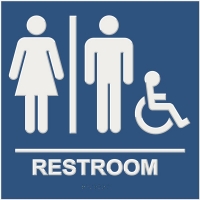 There’s a conflict between non-discrimination laws and religious freedom.
There’s a conflict between non-discrimination laws and religious freedom.
Where religious freedom exists to limit government’s intrusion into matters of conscience, non-discrimination laws invite government into private dealings and empower them to force people to do things they otherwise would be unwilling to do in the name of ending discrimination.
As non-discrimination laws become stronger, religious freedom becomes necessarily weaker.
That is why florists, photographers, and bakeries are being forced by governments to do things that violate their beliefs despite the fact that this is an acknowledged and unambiguous assault on those individual’s rights of conscience.
But religious freedom isn’t the only thing being harmed by non-discrimination laws.
Good sense and public decency appears to be in the crosshairs as well.
While religious freedom is being taken away in the name of stopping discrimination based on “sexual orientation” (for a good article on why anthropologists say sexual orientation didn’t exist until 150 years ago click here), many people don’t know what “sexual orientation” means.
In many jurisdictions, including Washington State, the definition of sexual orientation includes “gender identity”, “gender expression” or “transgender.”
This is where things just get silly.
Consider how this has been playing out all over the country:
- A San Antonio Macy’s clerk, named Natalie Johnson, was fired from her job because she told a man in a dress that he could not use the women’s dressing room.
- In Batavia, New York, a male high school teacher began dressing as a woman in anticipation of a sex-change operation. Parents who wanted their children removed from the class were told that was not possible because New York’s disability laws protected the teacher.
- A Catholic Hospital in Daly City, CA paid a $200,000 settlement in a discrimination lawsuit that was filed against them after they declined to perform “breast augmentation surgery” on a man who claimed to be a woman.
- A 5th grade boy at Asa Adams Elementary School in Orono, ME claimed to be a girl and as such wanted to use the girl’s restroom. When the school assigned the boy his own, separate bathroom, the parent’s filed a complaint against the school for “implicitly isolating” their child by not allowing him to use the girls restroom. The Maine Human Rights Commission ruled against the school saying it had unlawfully discriminated against the boy.
- Earlier this year, a man dressed as a woman attempted to sexually assault a woman in a San Diego women’s restroom.
 These examples are just the start.
These examples are just the start.
If a 100 pound, anorexic girl tells you she feels obese, you help her see herself in a way that conforms to reality. If that same girl tells you she feels like she’s a man, why should the response be different?
The way we feel does not change reality.



